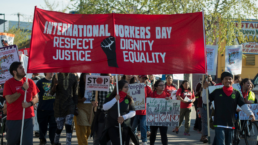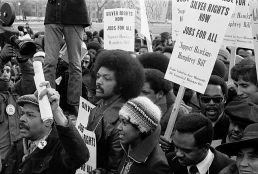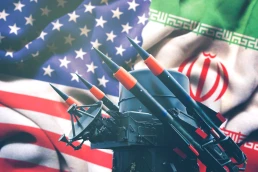In a tangled global economy, how can international labor solidarity go beyond symbolic support?
By Michelle Chen, Dissent
During last November’s Black Friday and Cyber Monday shopping bonanza, the hashtag #MakeAmazonPay started to percolate on Twitter. Activists circulated photographs of small rallies around the world, from a dockworkers’ banner drop in Sao Paolo to a demonstration in Berlin led by tech and warehouse workers opposing “Amazon’s dystopic surveillance practices.” A broad coalition of unions, environmental groups, and other allied organizations coordinated a day of action to condemn the e-tailer’s notorious pressure-cooker working conditions and demand an end to its systematic suppression of union organizing.

The scattered nature of these protests reflected how effective Amazon’s business model has been in atomizing its workforce. The German union ver.di reported a one-time work stoppage of about 2,500 workers across three cities. In Italy, the union SI Cobas posted a video of a one-day blockade of a fulfillment center in Piacenza, with “more than a thousand workers” condemning what the union called an expanding “precarious work model” that “creates a precedent for the whole of Italy, laying the foundations for the ruin of an entire generation of workers.” Yet elsewhere, Black Friday passed with no significant disruptions to Amazon’s business, which broke a record for sales that weekend. By the end of the year, the company had grown its workforce to 1.6 million people, about one-third outside the United States, an increase of 24 percent from the previous year.
The campaign was an expression of solidarity by a global community of sorts, but there were too few workers, too far from each other, to actually jam up Amazon’s gargantuan supply chain. In an increasingly integrated global economy, a huge employer like Amazon can forge a collective identity for workers across the world, but that collective experience does not easily translate into global organizing under the banner of international solidarity. For the last few decades, even as other social justice movements have become more oriented toward transnationalism and global politics, international labor solidarity has often been practiced only symbolically, reflecting the paradox of a global economy in which products and services flow seamlessly over borders that divide and ensnare workers.
Recent Posts
The Left Owes a Lot to Jesse Jackson
February 19, 2026
Take Action Now As a movement builder, spokesperson, and candidate for the presidency, Jesse Jackson’s accomplishments were massive. He was one of…
Trita Parsi Warns U.S. & Iran Have Incentives to Escalate Conflict
February 19, 2026
Take Action Now “We have a very dangerous situation, because both sides actually believe that a short, intense war may improve their…
Minneapolis: Organizing for the Protection of the Community
February 18, 2026
Take Action Now In speaking with residents in several parts of Minneapolis, beautiful stories of organizing on a block-by-block level emergedBy…
U.S. Sent a Rescue Plane For Boat Strike Survivors. It Took 45 Hours To Arrive.
February 17, 2026
Take Action Now In seas that could kill a person within an hour, it took nearly two days for a rescue plane to arrive.By Tomi McCluskey and Nick…




